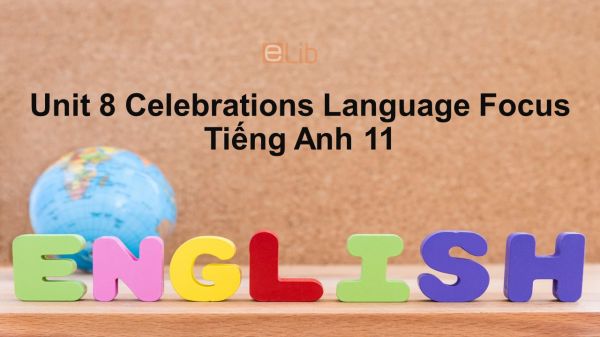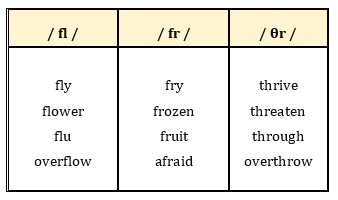Unit 8 lớp 11: Celebrations-Language Focus
Bài học Unit 8 lớp 11 Celebrations phần Language Focus hướng dẫn các em điểm ngữ pháp về đại từ bất định trong tiếng Anh (one, someone, no one, anyone,...) và từ vựng về các lễ hội.
Mục lục nội dung

1. Pronunciation Unit 8 lớp 11
Listen and repeat (Nghe và lặp lại)
Practise reading aloud this dialogue (Thực hành đọc to những câu sau)
A: Don’t throw these little flags onto the floor, Fred.
B: Oh, I’m sorry, Florrie. I’ll pick them up.
A: That’s all right, Fred. And are you hungry? Dinner’s ready.
B: Oh, good! What shall we have for dinner today, Florrie?
A: We’ll have three dishes: French fries, fried fish and cauliflower.
B: Good! I like all three of them. What about dessert?
A: I’ve made a fruit cake. But first, have some fruit juice.
It’s good for your throat and keeps away the flu.
B: Thanks, Florrie.
Tạm dịch
A: Đừng vứt những lá cờ nhỏ lên sàn nhà, Fred.
B: Ồ, con xin lỗi, Florrie. Con sẽ nhặt chúng lên.
A: Được rồi, Fred. Con đói không? Bữa tối xong rồi.
B: Ồ, hay quá. Tối nay mình ăn gì ạ, Florrie?
A: Chúng ta sẽ ăn 3 món: khoai tây chiên, cá chiên và súp lơ.
B: Tuyệt! Con thích cả 3 món. Món tráng miệng thì sao ạ?
A: Mẹ đã làm bánh hoa quả. Nhưng trước hết con hãy uống nước hoa quả đã. Nó tốt cho họng con và giúp tránh cảm cúm.
B: Cảm ơn, Florrie.
2. Grammar and Vocabulary Unit 8 lớp 11
2.1. Exercise 1 Unit 8 lớp 11
Complete the sentences, using someone, anyone, no one or everyone. Use each word twice (Hoàn thành các câu, sử dụng someone, anyone, no one hoặc everyone. Sử dụng mỗi từ hai lần)
1. I don't think ………… likes the film. It’s so boring.
2. ………… phoned while you were out, but they didn't leave a message.
3. Does ………… mind if I eat first?
4. There’s …………… at the door. Can you go and see who it is?
5. He didn’t come to class for three days, and ………… knows where he is.
6. Can we start now? Has ………… arrived?
7. Everyone said they would attend the party, but ………… turned up.
Guide to answer
1. everyone 2. Someone
3. anyone 4. someone
5. no one 6. everyone 7. no one
Tạm dịch
1. Mình không nghĩ mọi người thích phim này. Nó nhàm chán quá.
2. Ai đó đã gọi điện cho bạn khi bạn ra ngoài, nhưng họ không để lại lời nhắn.
3. Có ai phiền nếu mình ăn trước không nhỉ?
4. Có ai đó ở cửa. Bạn có thể đi xem là ai không?
5. Anh ấy đã không đến lớp 3 hôm nay rồi, và không ai biết anh ấy ở đâu.
6. Chúng ta có thể bắt đầu bây giờ rồi chứ? Mọi người đã đến đủ chưa?
7. Mọi người nói họ sẽ tham gia bữa tiệc, nhưng không ai đến.
2.2. Exercise 2 Unit 8 lớp 11
Rewrite the sentences, using the pronoun one(s) (Viết lại các câu, sử dụng đại từ one(s))
1. Of the three bags I like the blue bag.
2. Mai is making a fruit cake. Huong is making a fruit cake, too.
3. I like reading books, especially the books about the natural world.
4. I don't have a computer, and my father doesn't want me to have a computer.
5. They let me choose a pencil, and I took the red pencil.
6. There are several national celebrations in Vietnam, but perhaps the most meaningful celebration is Tet holiday.
7. We told each other both happy stories and sad stories about our lives.
Guide to answer
1. Of three bags, I like the blue one.
2. Mai is making a fruit cake. Huong is making one, too.
3. I like reading books, espccial the ones about the natural world.
4. I don't have a computer, and my father doesn't want me to have one.
5. They let me choose a pencil, and I took the red one.
6. There are several national celebrations in Vietnam, but perhaps the most meaningful one is Tet holiday.
7. We told each other both happy stories and sad ones about our lives.
Tạm dịch:
1. Trong 3 lá cờ, tôi hình cờ màu xanh.
2. Mai đang làm bánh hoa quả. Hương cũng đang làm một cái nữa.
3. Tôi thích đọc sách, đặc biệt là sách về thế giới hoang dã.
4. Tôi không có máy vi tính, nhưng bố không muốn tôi có máy vi tính.
5. Họ để tôi chọn bút chì, tôi chọn bút chì đỏ.
6. Có một số lễ hội quốc gia ở Việt Nam, nhưng có lẽ ý nghĩa nhất là Tết.
7. Chúng tôi kể cho nhau nghe những chuyện vui buồn trong cuộc sống.
2.3. Exercise 3 Unit 8 lớp 11
Use the words from the box to complete the following sentences (Sử dụng các từ từ hộp để hoàn thành các câu sau)
1. Before Tet, housewives are always busy cooking ……… foods.
2. The Prince’s wedding was a very ………… occasion.
3. Christmas is also the time for people to give and receive ………..
4. Each nation has its own way of …………. the New Year.
5. On the first day of the New Year, people often try to be nice and ………..
6. People go to pagoda to pray for ……….
7. If you walk on the street before Tet, you’ll find great……….everywhere
Guide to answer
1. traditional 2. grand
3. gifts 4. celebrating
5. polite 6. good luck 7. excitement
Tạm dịch:
1. Trước Tết, các bà nội trợ thường bận rộn nấu những món ăn truyền thống.
2. Hôn lễ của hoàng tử là một lễ hội rất lớn.
3. Giáng Sinh cũng là khoảng thời gian để mọi người tặng và nhận quà.
4. Mỗi quốc gia có những cách thức riêng để tổ chức Năm Mới.
5. Vào ngày đầu năm mới mọi người cố gắng tử tế và lịch sự.
6. Nếu trước Tết bạn đi dạo trên đường, bạn sẽ thấy sự nhộn nhịp rộn ràng khắp nơi.
3. Practice Task 1
Choose the one word or phrase - a, b, c, or d - that best completes the sentences or substitutes for the underlined part (Chọn từ hay cụm từ a, b, c hay d phù hợp nhất để hoàn thành các câu sau)
1. Family members who live apart try to get together ______ Tet.
a. in
b. at
c. on
d. during
2. Most towns put ______ a Christmas tree, a fir tree decorated with colored lights, shiny balls, tinsel and bows.
a. on
b. in
c. with
d. up
3. On Christmas Eve children go to bed full ______ excitement.
a. of
b. with
c. up
d. in
4. Agrarian people depend on the lunar calendar to prepare for their crops.
a. gardeners
b. planters
c. farmers
d. highlanders
5. There is a ______ mood everywhere on New Year's Day.
a. popular
b. good
c. optimistic
d. festive
6. In Britain and America, it is ______ for everybody to sing 'Auld Lang Syne' on New Year's Eve.
a. tradition
b. traditional
c. traditionally
d. traditionalism
7. Children are always ______ about Tet holiday.
a. excited
b. interested
c. keen
d. concerned
8. I shook hands and ______ a few words with the manager.
a. uttered
b. expressed
c. exchanged
d. converted
9. Jane is a very sociable girl. She likes parties and ______.
a. rituals
b. ceremonies
c. traditions
d. celebrations
10. Shopping malls are decorated for Christmas from September, ______ most people do not do their Christmas shopping until December.
a. though
b. because
c. so
d. so that
4. Practice Task 2
Complete these sentences with someone, something, anyone, anything, no one, nothing, everyone, everything (Hoàn thành câu với someone, something, anyone, anything, no one, nothing, everyone, everything)
1. We arranged the meeting, but _______ came.
2. Janet Jones is _______ I rarely see these days.
3. She valued friendship more than _______ in the world.
4. I always get to work before _______ else.
5. While you are making dinner, I'll get on with _______ else.
6. _______ has changed. Everything is the same as it was.
7. I hope _______ will be comfortable here. We try to make each guest feel at home.
8. We don't think there's _______ wrong with her reading ability,
9. Hardly _______ turn up to the meeting.
10. I am not going to the party because I've got _______ to wear.
11. I thought I heard _______ knocking at the door.
12. _______ calls her Maggie, but her real name's Margaret.
13. The earthquake destroyed _______ within a 25-mile radius.
14. There was complete silence in the room. _______ said _______.
15. Sarah was upset about _______ and refused to talk to _______
Để nhận dạng được các từ đồng nghĩa, từ trái nghĩa và nắm chắc các điểm ngữ pháp có trong Unit 8, mời các em cùng luyện tập với phần trắc nghiệm Unit 8 Language Focus Tiếng Anh 11 ngay sau đây.
6. Conclusion
Qua bài học này các em cần nắm điểm ngữ pháp về đại từ như sau
- Ta dùng one cho danh từ số ít và ones cho số nhiều.
- Ta sử dụng one, ones để tránh lập lại danh từ, chúng ta không thể sử dụng chúng thay cho danh từ không đếm được.
- Cấu trúc sử dụng one/ones
- Đôi khi chúng ta có thể dùng hoặc không dùng one ones sau this, that, these và those: each hoặc another: which: hoặc tính từ so sánh nhất.
Ví dụ
- I don't like these sweaters. I prefer those (ones) over there. (Tôi không thích những cái áo len này. Tôi thích những người (những người thân) ở đó.)
- I tried all three numbers, and each (one) was ensaged. (Tôi đã thử tất cả ba số và mỗi (một) đã tham gia.)
- The last question is the most difficult (one). (Câu hỏi cuối cùng dù khó khăn nhất (một).)
- Đôi khi, chúng ta không thể bỏ one/ ones.
Our house is the one on the left.
NOT Our house is the on the left.
- Chúng ta không thể bỏ one/ones nếu chúng đứng sau the, every, hoặc sau tính từ.
Ví dụ
- The film wasn't as good as the one we saw last week. (Bộ phim đã không được tốt như chúng ta đã thấy hôm trước.)
- I rang all the numbers, and every one was engaged. (Tôi gọi tất cả các con số và tất cả mọi người được tham gia.)
- I’d like a box of tissues. A small one, please. (Tôi muốn một hộp khăn giấy. Nhỏ thôi, làm ơn.)
- A small one và one
- Ta có thể nói a small one, a red one, v.v... nhưng không nói a one.
Ví dụ
- We decided to take a taxi. Luckily there was one waiting. (Chúng tôi quyết định đi taxi. May mắn có một chiếc đang đợi.)
- If you want a ticket. I can get one for you. (Nếu bạn muốn một chiếc vé, tôi có thể lấy một chiếc cho bạn.)
- Quan sát ví dụ có one, some, it và them.
Ví dụ
- I haven't got a passport, but I'll need one (one = a passport) (Tôi không có hộ chiếu, nhưng tôi sẽ cần nó.)
- I haven't got any stamps, but I’ll need some, (some = some stamps) (Tôi chưa có bất kì con tem nào, nhưng tôi sẽ cần một số.)
- I’ve got my passport. They sent it last week, (it = the passport) (Tôi đã có hộ chiếu của tôi. Họ gửi tuần trước.)
- I've got the stamps. I put them in the draver. (them = the stamps) (Tôi có những con tem. Tôi đặt chúng trong ngăn kéo.)
- Ta dùng one và some/ any khi điều ta muốn nói chưa xác định, và dùng it và they/them khi đã xác định rõ.
- Someone, anyone, everyone, no one
- Someone (một người nào đó)
- Động từ chia số ít, thường dùng trong câu xác định.
Ví dụ
Someone has stolen my sandals. (Một người nào đó đã trộm dép của tôi rồi.)
- Anyone (bất cứ ai)
- Động từ chia số ít, thường dùng trong câu phủ định, nghi vấn.
Ví dụ
Don't believe anyone in the house. (Đừng tin bất cứ ai trong nhà này.)
- Everyone (mọi/ mỗi người)
Động từ chia số ít, thường dùng trong câu xác định.
- No one (lưu ý chữ này viết rời ra): không ai, không người nào
Động từ chia số ít, thường dùng trong câu xác định.
Ví dụ
- No one likes him. (Không ai thích anh ta.)
- No, None (Không) (không ai, không thứ gì cả)
Cần nhớ công thức biến đổi từ NOT qua NO và NONE như sau:
Not + any = No
No + any = None
Ví dụ
I don’t see any books on the table. (Tôi không thấy quyển sách nào trên bàn cả)
= I see no books on the table. (Tôi không thấy quyển sách nào trên bàn cả.)
= I see none on the table. (Tôi không thấy gì trên bàn cả)
Tham khảo thêm
- doc Unit 8 lớp 11: Celebrations-Reading
- doc Unit 8 lớp 11: Celebrations-Speaking
- doc Unit 8 lớp 11: Celebrations-Listening
- doc Unit 8 lớp 11: Celebrations-Writing





